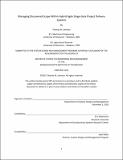Managing discovered scope within hybrid agile stage-gate project delivery systems
Author(s)
Johnson, Thomas M. (Thomas Merle)
Download1263357264-MIT.pdf (3.002Mb)
Other Contributors
Massachusetts Institute of Technology. Engineering and Management Program.
System Design and Management Program.
Terms of use
Metadata
Show full item recordAbstract
Complex mechatronic projects have machine functionality dependent upon substantial embedded software content delivered in coordination with the hardware componentry. This situation creates a dilemma for project leadership as they determine which methods to utilize for managing the project. One option is to utilize a hybrid approach where comingled Stage-Gate and Agile methods serve both hardware and software activities. However, the need for synchronized delivery schedules between the hardware and software components is not addressed well by Agile methods, which do not emphasize forward planning. In contrast, the uncertainty in defining software scope challenges the up-front scope definition relied upon by Stage-Gate methods. Three independently operating project delivery systems have each spent more than ten years weaving Agile software development methods into the classic Stage-Gate approaches to make their hybrid project management systems. This study interviews Agile and Stage-Gate leadership roles within each of these three project delivery systems to identify what has evolved to keep the schedule expectations for scope delivery aligned to the discovery of additional scope while software development progresses. This study finds that both the Stage-Gate and Agile leaders interviewed call for more work to be done in the project planning stage to improve the inclusion of more rigorous software scope identification activities. It also finds several differences in the design stage activities across the groups studied concerning how they accommodate the discovery of new software scope into the overall scope and schedule expectations for the project, each with a differing level of effectiveness. The most effective traits include the formalized identification and capture of the product decomposition and architecture so that it can be used to estimate software scope, schedule, and resources more accurately upfront in the planning stage. During the design stage, the most effective project delivery systems leverage the cultural acknowledgment and leadership's enforcement of the stakeholders' need to adjust their scope expectations in response to new scope discoveries. The addition of repeating two-month planning events deliver timely forecasts of software deliveries, and frequent scope management meetings allow for rapid adjustment to software scope discoveries. Each software delivery system added dedicated Software Delivery Lead roles to act as the liaison between the Agile and Stage-Gate management methods and to formulate mitigation activities with the rest of the functional area leads to the mechatronic product. Project delivery system developers may use these findings as a set of lessons learned to guide their pursuits with the integration of Agile practices into an existing Stage-Gate process. Others could build upon these findings by repeating the activity with other case studies to see if a pattern emerges, which could guide the creation of more specific Agile Stage-Gate frameworks.
Description
Thesis: S.M. in Engineering and Management, Massachusetts Institute of Technology, System Design and Management Program, February, 2021 Cataloged from the official version of thesis. Includes bibliographical references (pages 83-84).
Date issued
2021Department
Massachusetts Institute of Technology. Engineering and Management ProgramPublisher
Massachusetts Institute of Technology
Keywords
Engineering and Management Program., System Design and Management Program.